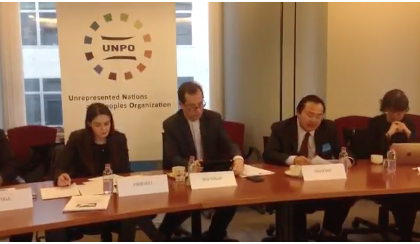| November 28-29, 2017 |
| Brussels, Belgium |
Full video coverage of the conference (video courtesy of UNPO)
From November 28-29, 2017, a Southern Mongolian delegation of five representatives including Mr. Enghebatu Togochog, Director of the Southern Mongolian Human Rights Information Center (SMHRIC), Mr. Hatgin Dolgion, President of the Inner Mongolia People's Party (IMPP), Dr. Chuluu Ujiyediin, founding member of the SMHRIC, Mr. Tsetsent Satoga, founding member of the IMPP, and Mr. Dugarjab Hotala, an independent researcher and the founder of InterMongol Network held a conference titled "False Autonomy: China's Colonial Rule Over Southern Mongolia" at the European Parliament in Brussels in collaboration with the European People's Party Group and the Unrepresented Nations and Peoples Organization (UNPO). The conference was moderated by Ms. Lucia Parrucci, a staff member of UNPO and the coordinator of the event.
Mr. Csaba Sógor, well-known human rights advocate and a member of the European Parliament and the European People's Party, made the opening remarks to stress the importance of human rights and minority rights as they are often overridden by security measures in many states. Sharing his own personal experience as a member of minority Hungarian in Romania, Mr. Sógor drew a comparison between the Hungarian people's experience of autonomy within Romania and China's false autonomy in Southern Mongolia.
In his remarks entitled "Overview of Human Rights Conditions of Southern Mongolia", Mr Enghebatu Togochog, on behalf of the Southern Mongolian Human Rights Information Center, raised his concerns on ongoing human rights abuses and humanitarian crisis in Southern Mongolia, specifically highlighting the cases of arbitrary arrest and extrajudicial detention of Mongolian activists, dissidents and herders including Ms. Bao Guniang, Ms. Yingge, Ms. Manliang, Mr. Wenming and Mr. Hada.
On behalf of the IMPP, Mr. Hatgin Dolgion presented a brief overview of the history of Southern Mongolian movement for freedom, self-determination and independence in his remarks entitled the "Aspiration for Freedom and Self-determination, History of Southern Mongolian Resistance Movements". Mr. Dolgion pointed out that despite the Chinese authorities' series of ethnic cleansing and genocide, the aspiration of Southern Mongolians for freedom and independence has never dwindled away.
Long term activist and a founding member of the IMPP, Mr Tsetsent Satoga, spoke about China's ethnic policy and the indigenous rights of the Southern Mongolians by sharing his and his family's tragic experience with the Chinese Communist regime until he went into exile in Japan. As many as eight members of his family had been persecuted to death since his hometown was taken over by the Chinese, according to Tsetsent's testimony. Tsetsent also gave out some examples of how the Southern Mongolians are denied the right to use their mother tongue and how the Mongolians as whole are marginalized on their own land.
In his speech entitled "China's Environmental Destruction in Southern Mongolia", Dr. Chuluu Ujiyediin, a founding member of SMHRIC and a long time human rights advocate, provided revealing statistics on how serious the environmental devastation including desertification, industrial pollution and water shortage in Southern Mongolia is, due primarily to China's so-called "economic development" and other government initiatives. Regarding Chinese migration to Southern Mongolia, Dr. Ujiyediin noted that the total population of Southern Mongolia had increased by 322.4% between 1947 to 2000. Among them, Chinese population increased from 4,686,000 to 18,324,000, reversing the Chinese to Mongolia ratio from 1:5 in 1949 to 6:1 today.
Independent researcher and the founder of the InterMongol Network, Mr. Dugarjab Hotala presented to the audience a clear picture and in-depth analysis of how the Mongolian language, culture and identity have been imposed a series of involuntary transformation under the Chinese colonial rule in Southern Mongolia. Bring China's ongoing "discussion of second-generation ethnic policy" to light, Dugarjab not only suggested that the so-called "discussion" is nothing but a Chinese way of testing the waters to implement the set agenda of wiping out all nationalities within their borders once for all, but also criticized China's inherent behavior of rewriting history not only of others but also of their own.
Dr. Ferenczy Zsuzsa-Ann, an accredited assistant for the European Parliament member László TŐKÉS and a member of European Parliament Committee on Foreign Affairs, was invited to make the closing remarks. Dr. Ferenczy Zsuzsa-Ann highlighted the Southern Mongolians' tireless struggle for justice, freedom, and self-determination as well as the importance of basic human rights and human dignity that China has been showing no respect to.






 Beyond
Great Walls: Environment, Identity, and Development on the Chinese
Grasslands of Inner Mongolia
Beyond
Great Walls: Environment, Identity, and Development on the Chinese
Grasslands of Inner Mongolia China's
Pastoral Region: Sheep and Wool, Minority Nationalities, Rangeland
Degradation and Sustainable Development
China's
Pastoral Region: Sheep and Wool, Minority Nationalities, Rangeland
Degradation and Sustainable Development The
Ordos Plateau of China: An Endangered Environment (Unu Studies on
Critical Environmental Regions)
The
Ordos Plateau of China: An Endangered Environment (Unu Studies on
Critical Environmental Regions)